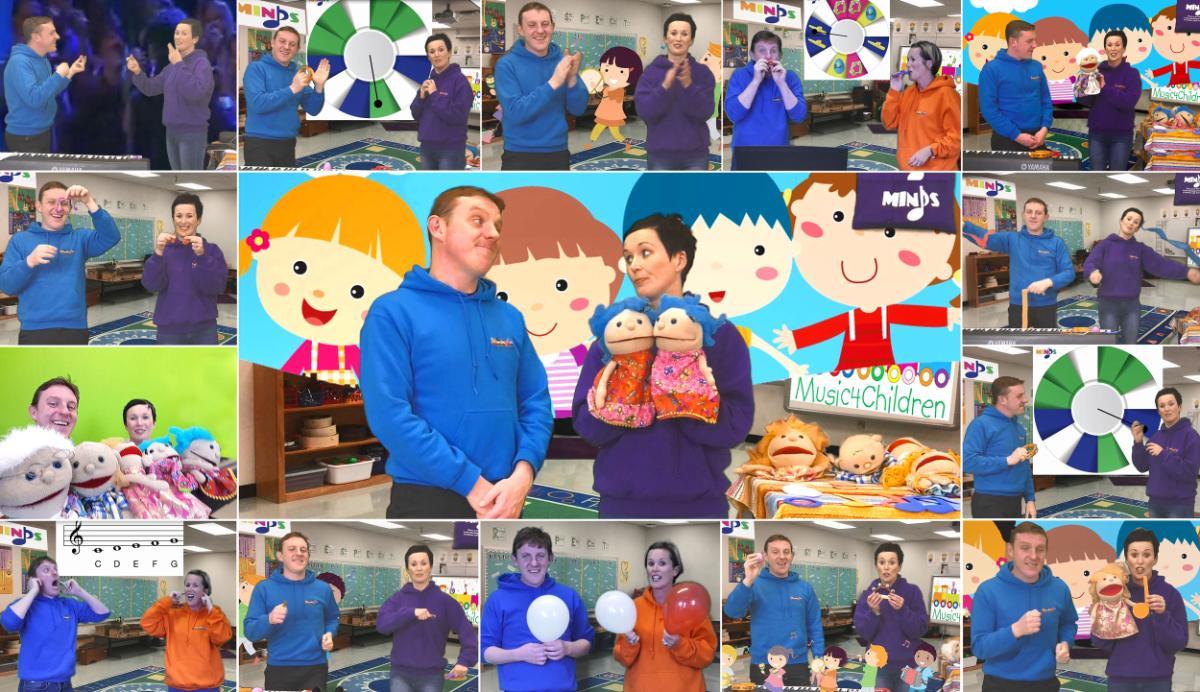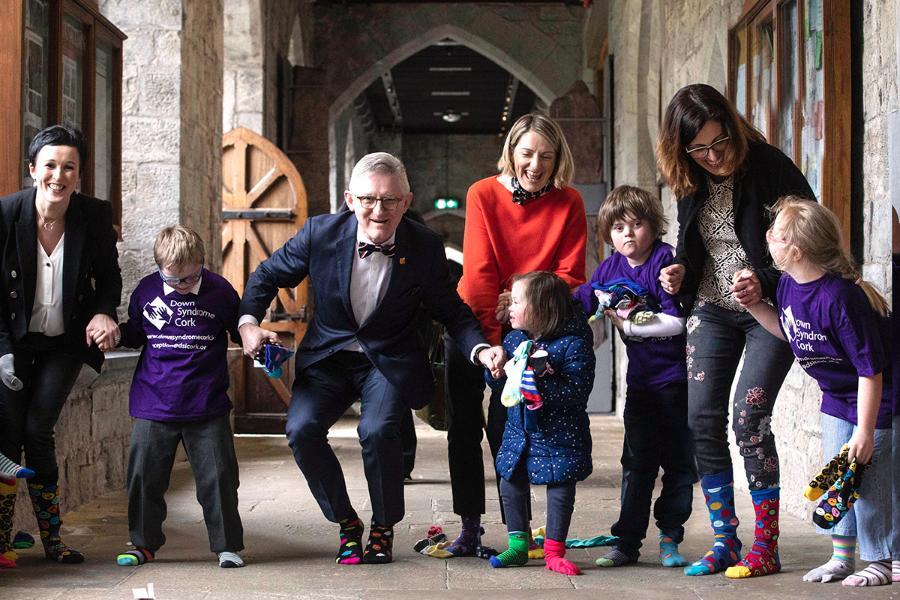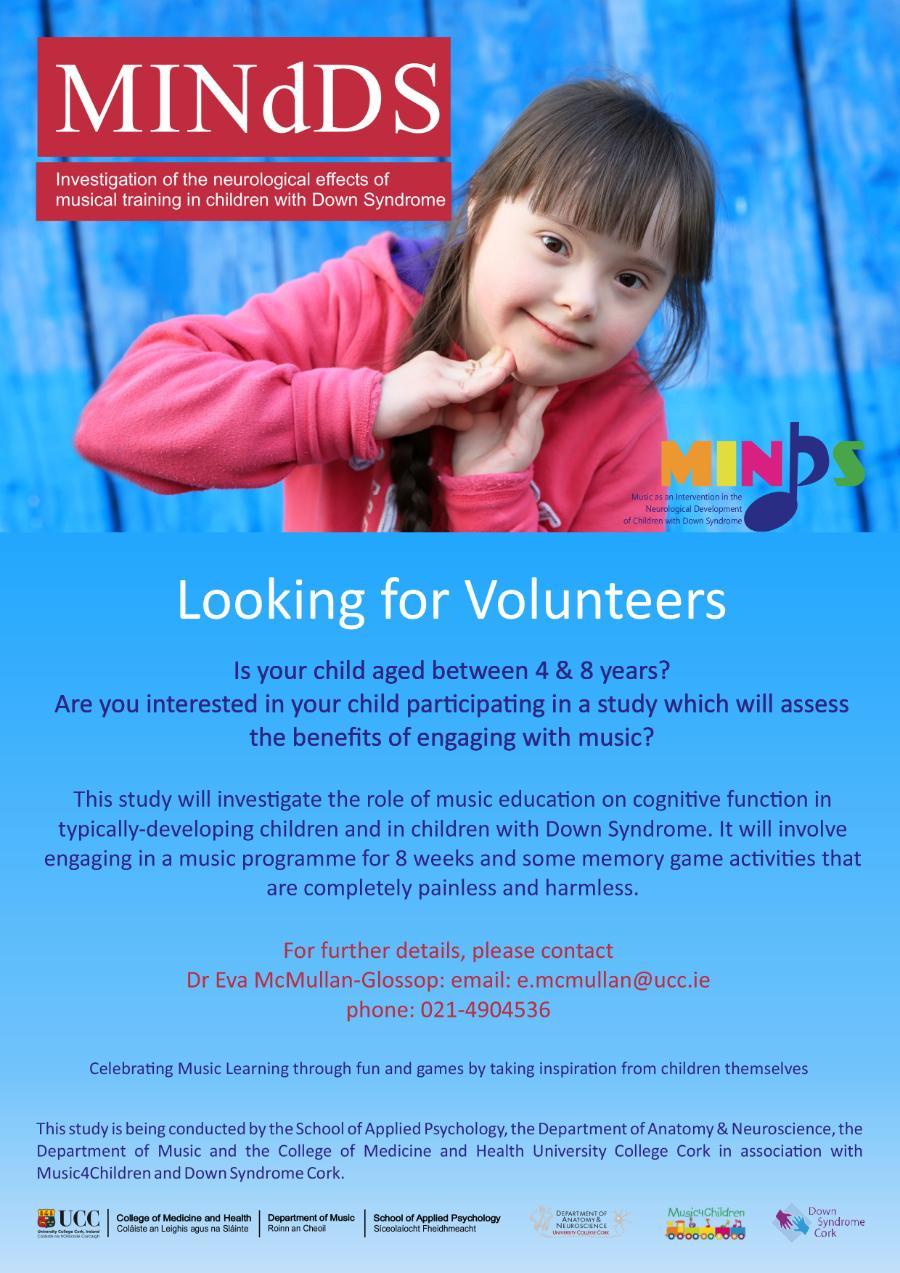The MINdDS research project (Music as an Intervention in the Neurological development of children with Downs Syndrome) is an innovative and exciting interdisciplinary research project based in University College Cork, funded by the College of Medicine and Health (CoMH), and launched on International Down Syndrome Day March 21st 2019 by UCC President Patrick O’ Shea.
The project, brings together academic researchers from the diverse fields of music, neuroscience and psychology in a study to assess the cognitive and neuro-biological effects of a specially designed music programme on children with Down Syndrome. At the core of the MINdDS project is ‘celebrating ability’, the team believes this is a powerful tool which enhances learning and supports further development of ability.

Action shots from the specially designed 8 Week Music Intervention Programme; Dr Eva McMullan and Pádraig Wallace introduce us to the Rhythm family of puppets: Granny Semibreve; Dad, Mr Minum; Mom, Cara Crotchet; and the superfast Quaver twins Caoimhe and Katie!! The fun instrument parade, meet the tambourine, egg shaker, sleigh bells kazoo, triangle and many many more!! meet the Instrument Clock and the Rhythm Clock, and lots songs and games and loads of fun.
♫ Join Dr Eva McMullan and Pádraig Wallace as they Introduce the 8 Week Music Programme in this short video
♫ Get a peek at a class with Eva and Pádraig as they sing 'FORTE PIANO' a song all about about loud and soft music.
The aims of this project are to understand the Behavioural, Neural, and Hormonal correlates associated with musical training and to establish whether it can be used as a possible intervention for children with Down Syndrome. Musical training constitutes a potential way to improve behavioural outcomes in children that have cognitive disorders, however, the specific benefits obtained are not well understood. The only way to improve these training techniques is to understand how they function at the neurological level.
The eight-week intervention involves…
- answering questionnaires on music engagement at the start and conclusion of the study;
- engaging with a selection of online videos designed and created specifically for the project;
- attending an online class facilitated by Dr. Eva McMullan and Pádraig Wallace, once a week for the duration of the project.
- doing some online cognitive tests and hormonal tests carried out at the start of the study and at its conclusion.
- Most importantly HAVING FUN!
At the core of the MINdDS project is ‘celebrating ability’, the team believes this is a powerful tool which enhances learning and supports further development of ability.
Leading the MINdDS project is Dr Eva McMullan, Department of Music UCC, with research supervisor Professor Yvonne Nolan, Department of Anatomy and Neuroscience, UCC and project researchers Dr Jason Chan and Dr Annalisa Setti from the School of Applied Psychology, UCC.
The MINdDS research project evolved from the very successful training programme ‘Music4Children’ which was set up in 2011 by Dr McMullan and primary school teacher Mr Pádraig Wallace. The programme, which has received both national and international attention celebrates learning music through fun and creativity, and takes its inspiration from contrasting cultures, musical genres and most importantly, the children themselves. The course encourages confidence building, independent thinking and playful interaction making learning music a positive experience.
I don’t think any of us at Down Syndrome Cork, every imagined when we started with Eva and the puppets at Music4Children, the amazing impact it would have on our kids. The amount of benefits these sessions have on auditory processing, language skills, speech, shared experience with parents, attention building, turn taking, literacy skills and most of all fun is astounding’ (Alison Wilson – Down Syndrome Cork).

Dr Eva McMullan, Department of Music UCC, and Director of Music4Children, Pádraig Wallace, Primary School Teacher and Director of Music4Children and Esther-Anna-Bennett, Music Therapist
Taught by Dr Eva McMullan, Pádraig Wallace and Esther-Anna-Bennett, the positive effects of music on children with DS has been noted locally by both parents and teachers who have reported increased attention and self-monitoring.
Mia really loves going to her music class and is so proud to be a part it. She really enjoys the structure and warm up song and especially the puppets! it has given her so many opportunities to build her confidence such as speaking in front of the group and singing & signing in front of an audience. She is learning lots of skills like turn taking, patience and social skills through interacting with her peers. And of course, she is learning about and appreciating music in a fun, interactive and recognizable way even for me! That is thanks to Eva and Esther’s patience, kindness, interactive and entertaining class. (Sharon Forde, Mia’s Mum)
In the News!
- Irish Examiner, ‘Music makers: New UCC programme for children with Down syndrome’ https://www.irishexaminer.com/lifestyle/arid-30917117.html
- Echo, ‘Making Music Accessible to All’ https://www.echolive.ie/corklives/arid-40152668.html
- ‘Music and science brought together to develop music programme for children with Down Syndrome’ https://www.ucc.ie/en/news/music-and-science-brought-together-to-develop-music-programme-for-children-with-down-syndrome.html

Dr Eva McMullan, UCC President Patrick O’Shea, Professor Yvonne Nolan, Dr Annalisa Setti and members of Down Syndrome Cork having fun at the Launch of MINdDS in University College Cork in 2019.
MINdDS is looking for Volunteers!
Is your child aged between 4 and 8 years? Are you interested in your child participating in a study which will assess the benefits of engaging with music?
The study will investigate the role of music education on cognitive function in Typically-Developing children and in children with Down Syndrome. The study will involve engaging in a music programme for 8 weeks and some memory game activities that are completely painless and harmless.
For further details, please contact: Dr Eva McMullan-Glossop at e.mcmullan@ucc.ie or call 021 4904536
This study is being conducted the School of Applied Psychology, the Department of Anatomy & Neuroscience and the Department of Music University College Cork in association with Music4Children and Down Syndrome Cork.

Download MINdDS Looking for Volunteers flyer
Department of Anatomy and Neuroscience
Anatamaíocht agus Néareolaíocht
Contact us
Room 2.33, 2nd Floor, Western Gateway Building, University College, Cork, Ireland
